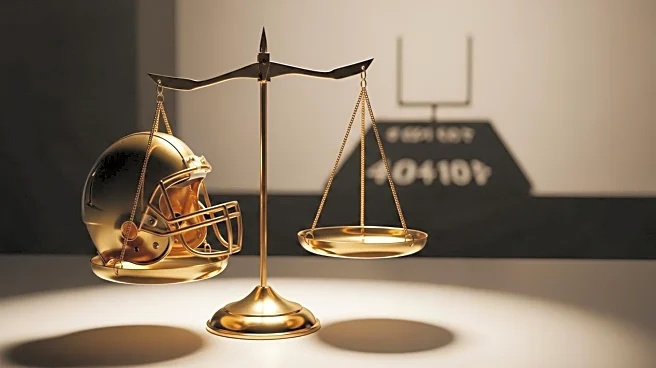What's Happening?
Indiana safety Louis Moore has been granted an injunction against the NCAA, allowing him to play for the remainder of the 2025 season. Moore challenged the NCAA's five-year eligibility rule, arguing that his three years at Navarro Junior College should not count towards his eligibility. Initially, the NCAA denied Moore a sixth year of eligibility, but a Texas judge approved the injunction, enabling him to continue playing without restrictions until January 29, 2026. Moore has been a key player for Indiana, leading the team in tackles and tying for first in interceptions. His performance has been crucial in Indiana's strong start to the season, including a recent victory over Illinois.
Why It's Important?
The injunction is significant as it allows Moore to continue contributing to Indiana's defense, which is vital for the team's aspirations to return to the College Football Playoff. Moore's presence strengthens Indiana's secondary, providing stability and experience. The ruling also sets a precedent for other players in similar situations, potentially influencing NCAA eligibility decisions. This development could impact the NCAA's approach to eligibility rules, especially concerning junior college transfers, and may lead to broader discussions about player rights and eligibility criteria.
What's Next?
With Moore cleared to play, Indiana will benefit from his defensive skills as they face upcoming challenges, including a game against Iowa and a significant matchup against No. 6 Oregon. The NCAA may need to address the implications of the injunction and consider adjustments to its eligibility rules. Other players in similar situations might seek legal avenues to challenge NCAA decisions, potentially leading to more cases and further scrutiny of the organization's policies.
Beyond the Headlines
The case highlights ongoing debates about NCAA regulations and player eligibility, particularly for those transferring from junior colleges. It raises questions about fairness and the impact of eligibility rules on athletes' careers. The legal victory for Moore could encourage more athletes to challenge NCAA decisions, potentially leading to reforms in how eligibility is determined and enforced.










